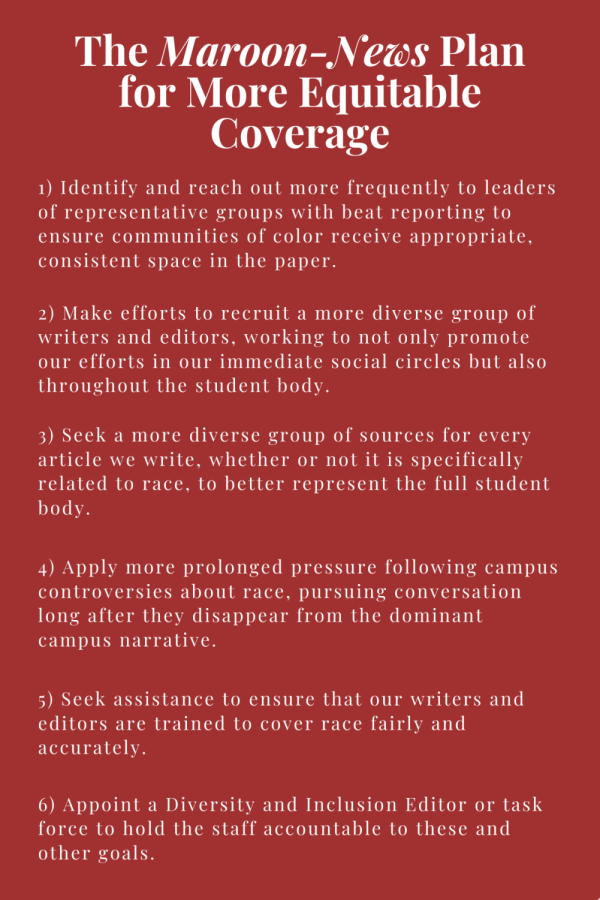Veritati: Taking Responsibility and Moving Forward
We stand in solidarity with our Black classmates, professors, administrators, staff and greater Colgate community of color. As a predominantly white staff, we acknowledge that we cannot begin to understand the pain and trauma long-experienced in the face of systemic and very personal racism. The pervasive pattern of racism at Colgate has made it clear that we have failed to amplify the voices of Black students and we take responsibility for our role in the erasure of Black stories on Colgate’s campus. Our story is flawed and we must acknowledge that before we pledge to do better. We are sorry for the ways in which we have let you down, whether or not you were aware of them.
However, acknowledgment of responsibility does nothing for the practical advancement of Black voices. As journalists, we value transparency, and as such, we feel it is important to share our reflective process and the actionable plan to hold our staff to higher standards. We encourage other Colgate institutions to engage in what may be uncomfortable self-reflection and create actionable plans for improvement.
We have come to face the reality that having a predominantly white staff has very real consequences on our coverage. While Colgate is also a predominantly white campus, we have failed to even match the level of diversity seen in our classrooms, dining halls, dorm rooms and social spaces. This becomes especially problematic because our cycle of news coverage is often casual in nature; we cover events, promote speakers and investigate stories discussed in the social and academic spaces our staff inhabits as individuals. In failing to curate constant and in-depth dialogue with groups outside of our typical circles, we have failed to address issues of race on campus outside of sensational events like hate crimes, speak outs or controversial guests. We have too failed to make our writing staff more inclusive to students of color to help share the stories of our community. Our failure to address this coverage gap is a white privilege; we have the privilege to choose when and how we discuss race.
As your sole student newspaper, we hold a very special responsibility to constantly represent and elevate all student voices and act as watchdogs for injustices. We promise to be allies not only in times of crisis, but in amplifying your voices at all times and in all facets of campus life. We must make our platform more equitable, accessible and representative for students of color to tell their own stories.
We have outlined the actionable steps we will be taking to play our part in exposing racial injustices and holding ourselves accountable, especially when there is not immense national and public pressure to do so. It is not your job to hold us accountable and we will strive to hold ourselves accountable; let it be said, though, that we welcome your feedback. If you have feedback on our plan or notice that we are failing to make changes, call us out.
Moving forward, we will:
(1) Identify and reach out more frequently to leaders of representative groups with beat reporting to ensure communities of color receive appropriate, consistent space in the paper.
- Student Organizations: Black Students Union, Sisters Of the Round Table, Brothers, Organization of Asian Sisters In Solidarity, Muslim Students Association, Caribbean Students Association, African Students Union, Chinese Interest Association, Colgate International Community, South Asian Cultural Club, Latin American Students Organization, Korean Culture Association, Armenian Students Association, Korean Culture Association, Organization of Asian Sisters in Solidarity, Colgate Student Coalition*
- Vice Provost for Equity and Diversity
- ALANA Cultural Center
- Title IX Coordinator
- Office of Undergraduate Studies (OUS)/First Generations Program
- MOSAIC, Alumni of Color Network
- Raiders of Color Connect
(2) Make efforts to recruit a more diverse group of writers and editors, working to not only promote our efforts in our immediate social circles but also throughout the student body.
- Intentionality with fliers and promotional materials in spaces specifically focused on people of color
- Increase the type of media we use to encourage more student involvement in a variety of ways, including podcasting, radio and video journalism
- Increase in-person collaboration between writers and staff with all-staff meetings
(3) Seek a more diverse group of sources for every article we write, whether or not it is specifically related to race, to better represent the full student body.
- Place particular focus on Arts & Features and Baker’s Dozen to amplify the art, music, talents and activism of students of color
- Develop a specific space for students of color in the form of a column or recurring segment
(4) Apply more prolonged pressure following campus controversies about race, pursuing conversation long after they disappear from the dominant campus narrative.
- Better understand and report on the Equity Grievance Policy and process
- Follow up on investigations
- Elevate student voices through commentary pieces long after the immediate aftermath
(5) Seek assistance to ensure that our writers and editors are trained to cover race fairly and accurately.
- Invite a journalist who focuses on covering race to train staff
- Reach out to alumni and other college newspapers who succeed in coverage related to race
- Staff sensitivity or IGD training
(6) Appoint a Diversity and Inclusion Editor or task force to hold the staff accountable to these and other goals.
*The Maroon-News is a Colgate Student Coalition Partner.
Emily Rahhal is a senior from Los Angeles, California double concentrating in Middle Eastern and Islamic Studies and Religion. She has previously worked...









